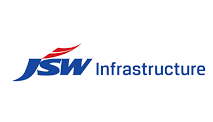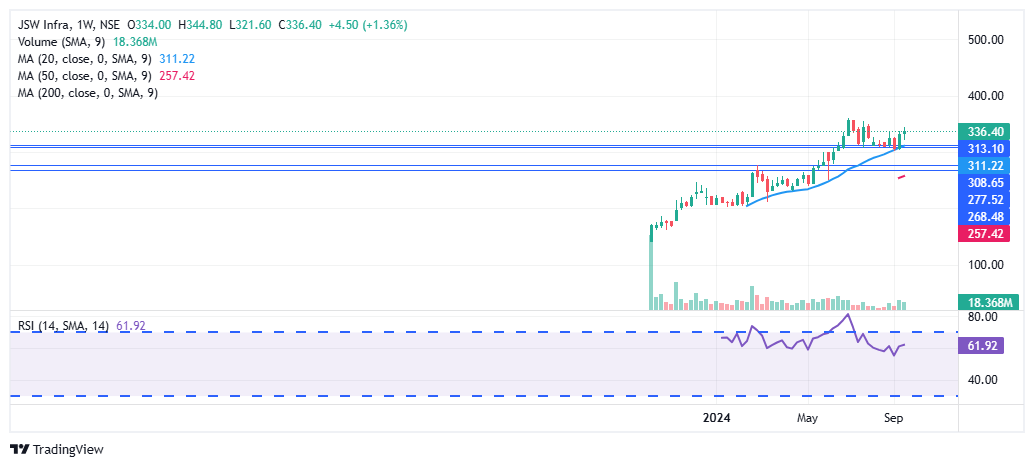JSW Infrastructure
A part of the JSW Group
JSW Infrastructure, a part of the JSW Group, is India’s second-largest commercial port operator by cargo handling capacity.
Business Segments:
JSW Infrastructure operates:
Two port terminals under O&M agreements with a cargo handling capacity of 41 MTPA in the UAE.
Nine ports in India spanning the country’s western and eastern coasts, including two non-major ports in Maharashtra and port terminals at major ports in Goa, Karnataka (west coast), Odisha, and Tamil Nadu (east coast).
The company manages various types of cargo, including:
Dry Bulk: Thermal coal, iron ore, sugar, urea, gypsum, barites, laterites.
Liquid Bulk and Gases: Edible oils, LPG, LNG.
Containers: General container cargo.
Strategic Initiatives:
JSW Infrastructure is on a transformative journey to become a comprehensive logistics solutions provider, with a focus on cost-effective last-mile connectivity. Notable initiatives include:
Acquisition of Navkar Corporation: Owning container freight stations and inland container depots, this aligns with JSW’s strategy to build a national logistics network.
Gati Shakti Multimodal Cargo Terminal: An acceptance letter has been received for its construction and operation in Arakkonam, Chennai, enhancing connectivity to major transportation routes.
Growth Projects:
Keni Port, Karnataka: A greenfield deep-water port is under construction through a public-private partnership, with an investment of ₹4,119 crore.
JNPA Liquid Terminal: Engineering work is underway, with operations set to begin by March 2025.
Chidambaranar Port (Tuticorin): Development of a new 7-million-ton cargo berth has commenced, further expanding the company’s portfolio.
Expansion Plans:
JSW Infrastructure is focused on boosting operational capacity through:
Port Capacity Expansion: The company aims to grow its current capacity from 158 MTPA to around 300 MTPA by 2030.
Diversification: Plans include expanding into container cargo, liquid bulk, and LPG handling, broadening its market and revenue sources.
Strategic Acquisitions & Greenfield Projects: JSW Infra is exploring further expansions, such as at Jaigarh Port, Maharashtra, and a new deep-sea port in Odisha.
Sustainability Initiatives: Commitment to reducing its carbon footprint by adopting electric cargo handling equipment, renewable energy at its facilities, and cleaner fuels for logistics.
Recent Public-Private Partnership Wins:
North Cargo Berth-III at V.O. Chidambaranar Port (Tuticorin): Capex of ₹600 crore.
Liquid Berths (LB3 & LB4) at Jawaharlal Nehru Port (JNPA): Capex of ₹100 crore.
Clients:
JSW Infrastructure serves a broad range of clients, primarily in shipping, logistics, and industrial sectors, including:
Steel Manufacturing: Supporting JSW Steel with raw materials and finished goods transportation.
Power Sector: Handling coal and energy-related cargo for power generation.
Cement Industry: Managing the import/export of limestone and clinker.
Automotive Sector: Facilitating the transportation of automotive components and vehicles.
Capital Expenditure (Capex):
During the Q1 FY2025 conference call, JSW Infrastructure indicated a total planned Capex of approximately ₹13,000 to ₹14,000 crore.
Morbi Expansion Opportunity:
Although JSW Infrastructure currently lacks a presence in Gujarat, Morbi presents a potential entry point. Strategic tie-ups with existing terminals in Morbi could complement the company’s other terminals and bolster operations in the Mumbai region and beyond.
Financial Snapshot (2022 - TTM):
Net Sales: ₹2,273 crore (2022) → ₹3,895 crore (TTM)
Operating Profit: ₹1,109 crore (2022) → ₹2,028 crore (TTM)
Operating Profit Margin: 49% (2022) → 52% (TTM)
Net Profit: ₹330 crore (2022) → ₹1,135 crore (TTM)
Earnings Per Share (EPS): ₹54.02 (2022) → ₹5.36 (TTM)
ROE: 19%, ROCE: 16.40%
P/E Ratio: 62.71, against the industry average of 31.15.
Cash & Bank Balance: ₹4,316 crore (as of March 31, 2024), with Gross Debt of ₹4,381 crore, leaving the company nearly debt-free.
Operational Challenges and Risks:
Volume Decline: A planned maintenance shutdown at the Dolvi steel facility led to decreased cargo volumes at the Dharamtar and Jaigad ports. However, the Dolvi plant has resumed full production, with no further volume reductions expected for the remainder of the year.
Recent Financial Challenges:
JSW Infrastructure reported an 8.9% drop in net profits in the quarter ending June 2024 compared to the same period in 2023. Rising operational costs, which increased by 40%, were a major factor impacting profitability. This has raised some concerns among investors despite the company’s revenue growth.
Chart
Technical Analysis:
On the weekly chart, the stock is approaching its all-time high after retesting the ₹223 level. Prices are expected to continue their upward trend in the long term (though this is not a recommendation). Please refer to the disclaimer for more details.
Conclusion:
JSW Infrastructure’s strong market position, promoter experience, promising demand outlook, growth projects, expansion plans, and recent order wins are expected to support long-term growth. However, investors should be mindful of the company's premium valuation.
Disclaimer: This document is for informational purposes only and does not constitute investment advice. All opinions expressed are personal and may contain errors.




